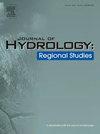基于代理的社会-水文模型识别和田河流域农业灌溉与生态输水权衡之间的反馈作用
IF 4.7
2区 地球科学
Q1 WATER RESOURCES
引用次数: 0
摘要
研究区域中国西北部的和田河流域研究重点农业灌溉与生态输水之间的冲突在干旱的内陆河流域尤为严重。水资源系统涉及多个利益相关者和部门,使农业与生态之间的动态反馈识别变得更加复杂。本研究提出了一个基于代理的社会-水文建模(ABSHM)框架,以解决这些互动问题。对该地区的新水文见解利用和田河流域绿洲决策敏感性的动态状态变量对反馈进行量化。当灵敏度在 0.03 到 0.06 之间时,水资源管理者会优先考虑农业灌溉,以生态用水为代价将农业灌溉用水量从 800 万立方米增加到 4,700 万立方米。相反,当灵敏度在 0.015 到 0.03 之间时,生态健康要求通过减少灌溉将生态用水量从 2700 万立方米增加到 6600 万立方米。ABSHM 框架可有效捕捉这些动态反馈过程,为流域水资源管理和决策提供支持。ABSHM 框架的独特之处在于它能够捕捉个体决策行为对整个水资源系统的影响。这为应对当前和未来的水资源管理挑战提供了新的视角和方法。本文章由计算机程序翻译,如有差异,请以英文原文为准。
An agent-based socio-hydrological modeling to identify the feedbacks between agricultural irrigation and ecological water conveyance tradeoffs in Hotan River basin
Study region
Hotan River basin in Northwest China
Study focus
The conflict between agricultural irrigation and ecological water conveyance is particularly critical in arid inland river basins. Water resource systems involve multiple stakeholders and sectors, complicating the identification of dynamic feedback between agriculture and ecology. This study presents an agent-based socio-hydrological modeling (ABSHM) framework to address these interactions.
New hydrological insights for the region
Feedback is quantified using dynamic state variable of oasis decision-making sensitivity in the Hotan River basin. When this sensitivity ranges from 0.03 to 0.06, water managers prioritize agricultural irrigation, increasing its usage from 8 to 47 million m3 at the expense of ecological water. Conversely, when sensitivity is from 0.015 to 0.03, ecological health requires increasing ecological water use from 27 to 66 million m³ by reducing irrigation. The ABSHM framework effectively captures these dynamic feedback processes, supporting basin water resources management and decision-making. The uniqueness of the ABSHM framework lies in its ability to capture the impact of individual decision-making behaviors on the overall water resource system. This offers new perspectives and approaches for addressing current and future water resource management challenges.
求助全文
通过发布文献求助,成功后即可免费获取论文全文。
去求助
来源期刊

Journal of Hydrology-Regional Studies
Earth and Planetary Sciences-Earth and Planetary Sciences (miscellaneous)
CiteScore
6.70
自引率
8.50%
发文量
284
审稿时长
60 days
期刊介绍:
Journal of Hydrology: Regional Studies publishes original research papers enhancing the science of hydrology and aiming at region-specific problems, past and future conditions, analysis, review and solutions. The journal particularly welcomes research papers that deliver new insights into region-specific hydrological processes and responses to changing conditions, as well as contributions that incorporate interdisciplinarity and translational science.
 求助内容:
求助内容: 应助结果提醒方式:
应助结果提醒方式:


